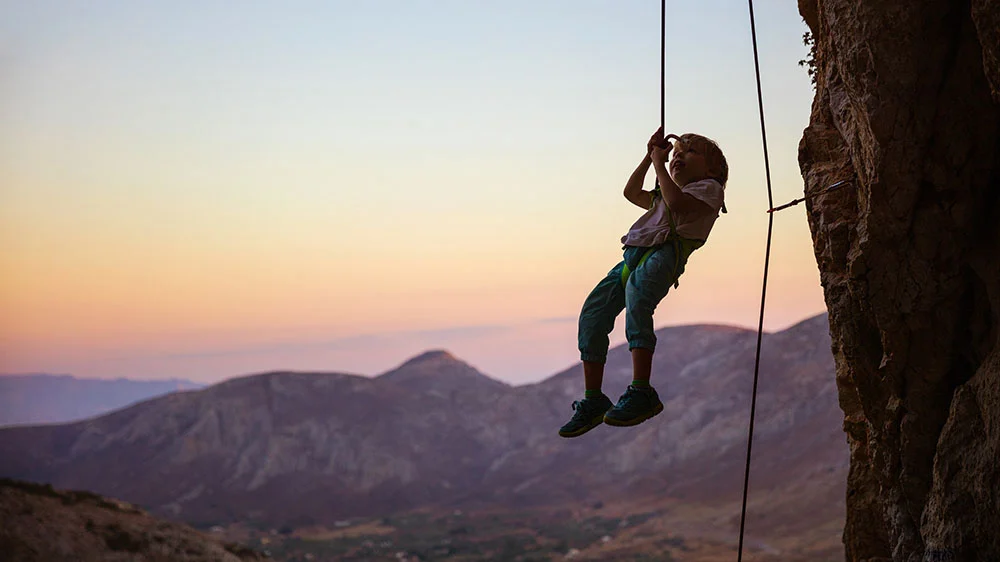In a mountainous region where clouds draped the peaks like veils, one tribe lived above and another below. Life between them was divided by sheer cliffs and steep ridges, but one day the quiet rhythm was shattered: a little girl from the valley was stolen by those who lived above. The strongest men of the lower tribe gathered their courage and chased the captors up the mountainside. But the mountain showed no mercy. Its edges were too sharp, its slopes too unforgiving. They climbed, slipped, tried again, and tried again still. Days passed, hope thinned, and the impossibility of the task pressed against their chests until they wondered whether the child had already vanished into the realm of what couldn’t be regained.
Then, just as despair was becoming familiar, the child’s mother appeared on the ridge — descending from the heights with her daughter held firmly against her heart. Her face was streaked with dust and sweat, her clothing torn by branches, her steps slow but steady. The men could hardly speak. How had she crossed what defeated them? How did she navigate what swallowed their strength? Her answer was only four quiet words, but they held the weight of heaven: “She is my child.”
There are moments in life when explanation shrinks beside conviction. Her reply revealed why her feet found a path no one else saw. Love had turned the impossible into the inevitable. What others attempted out of duty, she accomplished out of identity. They tried because they wanted success. She climbed because she could accept nothing less than her child’s return. When love becomes the engine, mountains lose the authority to dictate the outcome.
Long before this mother crossed the ridge, Scripture had been teaching the same truth. Human beings are capable of astonishing endurance when the heart is captured by a holy necessity. When Jesus said His food was to do the will of the Father, He wasn’t describing desire — He was describing the force of identity. The Son did not come to Earth out of mere want; He came because love demanded it. He walked into suffering not because it was easy or logical, but because it was necessary. Necessary for redemption. Necessary for reconciliation. Necessary because we are His. The mountain He climbed — a hill called Golgotha — was far steeper than the one beneath the valley mother’s feet. Yet He conquered it with the same quiet resolve: These are My children.
The distance between wanting and needing is the distance between half-hearted progress and unstoppable perseverance. Every person has lived in both worlds. We’ve said we “wanted” to change, to grow, to become better, to break habits, to forgive, to pursue dreams. And often we meant it — until resistance arrived, until the path became steep, until easier comforts whispered seductive alternatives. Want falters because it draws its strength from circumstances. But necessity — true necessity — draws its strength from identity.
There have also been moments when we acted not because we preferred to, but because something within us insisted that we must. When the bill was due, when the sick needed care, when a promise required keeping, when someone depended on us, when God spoke to our spirit and the cost of disobedience felt higher than the inconvenience of the task. In those moments we rearranged schedules, abandoned excuses, discovered resilience we didn’t know we possessed. Because the heart understands what the brain tries to negotiate: love is stronger than logic, and calling is stronger than comfort.
The mother scaling the mountain wasn’t fearless; she was fueled. She wasn’t superhuman; she was surrendered to what mattered more than her exhaustion. Her courage didn’t erase the dangers. It eclipsed them. When she decided that returning her child was not simply desirable but non-negotiable, the cliffs stopped being reasons to quit and became terrain to cross.
And here is the truth that presses gently but firmly against every soul: many of the dreams we’ve postponed, the callings we’ve delayed, the healing we’ve resisted, the obedience we’ve avoided — these remain unfinished not because the mountain is too tall, but because we still treat them as wishes. A life can stay locked in place for years because the heart whispers, I want this, but not yet, not now, not fully.
Yet something remarkable happens the moment a desire becomes a mandate. When God speaks to the heart and ignites conviction, when love for Him outweighs the fear of the climb, when obedience becomes more essential than convenience, mountains begin to shift. The terrain does not suddenly smooth, but the soul becomes steady. You stop asking whether the path is easy and start asking only whether it is yours. And when it is yours, every step, every bruise, every moment of fatigue becomes part of a holy journey.
The mother who descended the mountain did not do so because she possessed superior skill. She succeeded because she understood something the men did not: nothing could be permitted to stand between her and her child. That kind of resolve is what the Spirit of God awakens in those who belong to Him. Not a frantic striving, but a steady, fierce devotion. The kind that says, “I cannot remain where I am, because love calls me forward.” The kind that mirrors the Father who ran toward the prodigal, the Shepherd who left the ninety-nine, the Savior who carried the cross.
If you look at the areas in your life where progress has been elusive, where hope flickers but never fully ignites, ask not whether you want the outcome — ask whether you’ve embraced the identity required for the journey. The difference between the men who tried and the mother who succeeded was not strength; it was love. And love — real, divine, grounded love — transforms the steepest peak into a path.
When what God has called you to becomes not a preference but part of your purpose, excuses lose their currency. Time rearranges. Fear quiets. Vision sharpens. And the climb, however rugged, becomes possible.
For the one who knows who they are, the question is never, “Can I?”
The question is, “Must I?”
And when the answer is yes — when identity and love combine — the mountain is already conquered.
Because the God who placed the calling within you is the same God who once carried you Himself, saying with the resolve of a Father on His own mountain, “This one is Mine.”






